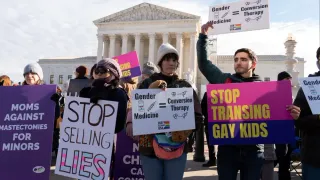
3 hours ago
Trump Administration Demanded Confidential Data on Transgender Youth Seeking Care, Sparking Outrage and Legal Challenges
READ TIME: 3 MIN.
On August 20, 2025, multiple sources confirmed that Trump administration officials directed state health agencies and medical providers to submit confidential data on transgender children and adolescents seeking gender-affirming care in the United States . The order, part of a broader campaign to restrict access to gender-affirming healthcare, has fueled widespread concern about patient privacy, medical ethics, and the wellbeing of transgender youth.
According to multiple legal filings and healthcare reports, the Trump administration instructed state Medicaid programs and hospital systems to provide “identifying data” on minors who had sought or received care related to gender dysphoria—including those prescribed puberty blockers or hormone therapy . Federal officials claimed the move was necessary to evaluate the “quality standards and procedures” for gender transition care in pediatric settings, but advocates and medical professionals criticized it as an unprecedented breach of privacy and a targeted attempt to intimidate families and providers.
Providers in Connecticut, Illinois, and New York reported receiving formal requests for patient records—including names, dates of birth, and details of care—under threat of losing federal funding or facing administrative sanctions if they refused to comply . In some cases, clinics serving transgender youth shuttered their programs, fearing legal repercussions and the safety of their patients.
Healthcare professionals described the federal demands for confidential data as “politically motivated” and deeply harmful to their patients. Heather Page, whose 11-year-old transgender daughter was preparing to begin hormone treatment, shared her family’s distress after Yale New Haven Children’s Hospital abruptly closed its gender-affirming care program: “She’s on the brink of puberty … We want her to be able to live comfortably in her own skin. Now, we’re scrambling to find a doctor who won’t be afraid to treat her” .
Daniel Heumann, a transgender advocate and university student, echoed these concerns, noting that disruption to care can have devastating effects: “This care is what saves kids. The people I know relying on Connecticut Children’s for their care are terrified. Hospitals are afraid to help us because of these data demands and threats from Washington” .
In response to the administration’s directive, a coalition of state attorneys general led by New York’s Letitia James filed suit in federal court, arguing that the data demands constituted unlawful harassment and intimidation of providers and families seeking medically necessary, legally protected care . The suit alleges that the administration’s campaign threatens the constitutional rights of patients, violates longstanding medical privacy laws, and undermines the ability of states to regulate healthcare within their borders.
“The federal government is running a cruel and targeted harassment campaign against providers who offer lawful, lifesaving care to children,” Attorney General James said in a statement. “This administration is ruthlessly targeting young people who already face immense barriers just to be seen and heard, and are putting countless lives at risk in the process. In New York and nationwide, we will never stop fighting for the dignity, safety, and basic rights of the transgender community” .
A federal judge in Baltimore issued a temporary restraining order in February, blocking enforcement of an earlier Trump executive order that sought to restrict gender-affirming care for youth nationwide. The court’s decision, celebrated by organizations including PFLAG National, states that “parents of transgender kids should never be in the frightening position of having their child’s medically necessary care canceled at the whim and threat of a politician” .
Experts warn that the administration’s actions have far-reaching effects on the health and safety of transgender youth. The rescission of federal guidance on collecting sexual orientation and gender identity (SOGI) data in Medicaid and CHIP, combined with the push for patient-level data on minors, threatens to erase vital information about health disparities and gaps in care . Without this data, it becomes harder to address inequities and ensure that all children—regardless of gender identity—receive appropriate, evidence-based treatment.
Advocates emphasize that privacy and trust are essential to health care for transgender youth, whose families already face stigma, discrimination, and logistical barriers to accessing care. “Forcing providers to withhold medically-necessary, evidence-based care not only threatens patient health and well-being, but also undermines the integrity of our healthcare system in its entirety,” noted legal experts involved in ongoing litigation .
As lawsuits proceed and advocacy organizations mobilize, families and providers remain determined to protect the rights and dignity of transgender children. In the words of one advocate, “These kids deserve safety, respect, and the chance to grow up healthy. We will fight for them—no matter how long it takes” .
For young people and families in crisis, support is available through resources such as the 988 Suicide and Crisis Lifeline.






